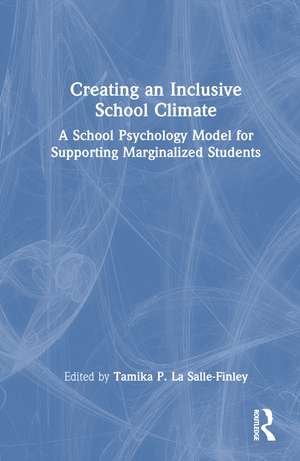Creating an Inclusive School Climate: A School Psychology Model for Supporting Marginalized Students
Editat de Tamika P. La Salle-Finleyen Limba Engleză Hardback – 25 iul 2023
| Toate formatele și edițiile | Preț | Express |
|---|---|---|
| Paperback (1) | 310.04 lei 3-5 săpt. | +21.05 lei 10-14 zile |
| Taylor & Francis – 25 iul 2023 | 310.04 lei 3-5 săpt. | +21.05 lei 10-14 zile |
| Hardback (1) | 1171.30 lei 6-8 săpt. | |
| Taylor & Francis – 25 iul 2023 | 1171.30 lei 6-8 săpt. |
Preț: 1171.30 lei
Preț vechi: 1232.94 lei
-5% Nou
Puncte Express: 1757
Preț estimativ în valută:
224.12€ • 234.63$ • 185.45£
224.12€ • 234.63$ • 185.45£
Carte tipărită la comandă
Livrare economică 05-19 aprilie
Preluare comenzi: 021 569.72.76
Specificații
ISBN-13: 9781032009117
ISBN-10: 103200911X
Pagini: 326
Ilustrații: 16 Tables, black and white; 9 Line drawings, black and white; 3 Halftones, black and white; 12 Illustrations, black and white
Dimensiuni: 152 x 229 x 19 mm
Greutate: 0.76 kg
Ediția:1
Editura: Taylor & Francis
Colecția Routledge
Locul publicării:Oxford, United Kingdom
ISBN-10: 103200911X
Pagini: 326
Ilustrații: 16 Tables, black and white; 9 Line drawings, black and white; 3 Halftones, black and white; 12 Illustrations, black and white
Dimensiuni: 152 x 229 x 19 mm
Greutate: 0.76 kg
Ediția:1
Editura: Taylor & Francis
Colecția Routledge
Locul publicării:Oxford, United Kingdom
Public țintă
Postgraduate and ProfessionalCuprins
Section I: Foundations 1. Introduction to School Climate: Past, Present, and Future 2. Leveraging the Every Student Succeeds Act to Pursue Equitable School Climate Practice and Policy Section II: School Climate Among Minoritized and Marginalized Populations 3. Introduction to Improving School Climate for Minoritized and Marginalized Students 4. Promoting a Positive School Climate School Climate and Black and African American Students 5. Promoting a Positive School Climate for Asian American Students 6. Promoting a Positive School Climate for Latine Students 7. Promoting Positive School Climate for Multi-Racial/Ethnic Students 8. Promoting a Positive School Climate for LGBTQ Youth 9. Promoting a Positive School Climate for Students with Disabilities 10. Promoting a Positive School Climate for Indigenous Students Section III: Strategies for Promoting a Positive School Climate 11. Improving School Climate Within Multi-Tiered Systems of Support 12. Triangulation of Data: Using Student, Teacher, and Parent Data to Improve School Climate 13. School Climate in Virtual Settings 14. Case Study: Using School Climate Data to Support a Positive School Climate Appendix
Notă biografică
Tamika P. La Salle-Finley is Associate Professor and Director of the Center for Research on School Safety, School Climate, and Classroom Management in the Department of Counseling and Psychological Services in the College of Education & Human Development at Georgia State University, USA. Currently, she is Editor-in Chief of the International Journal of School & Educational Psychology. Previously, she was Associate Professor of School Psychology in the Department of Educational Psychology at the University of Connecticut, USA, and Visiting Professor in the Department of Neuroscience, Imaging, and Clinical Science at D'Annunzio University, Italy.
Descriere
Creating an Inclusive School Climate introduces school psychology stakeholders to a wealth of foundations, individualized experiences, and school improvement efforts intended to bolster the outcomes of our most vulnerable learners.
